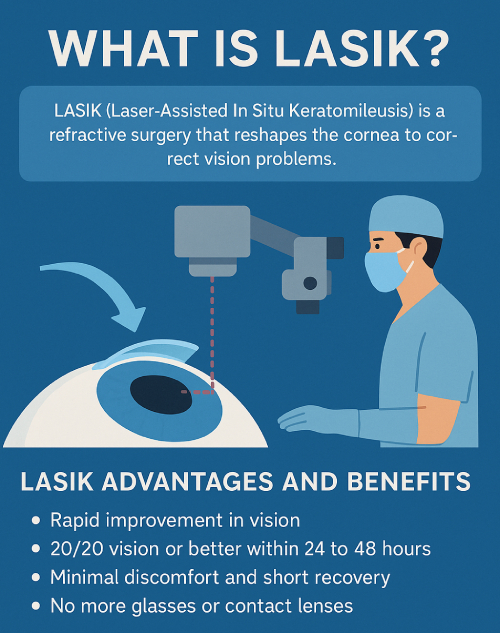Posted by: Caster Eye Center in lasik

LASIK has become a popular vision correction solution, but determining whether it’s the best option requires careful evaluation of individual circumstances. A qualified laser eye surgeon can assess your specific needs and recommend the most appropriate treatment. While LASIK offers remarkable results for many patients, several vision correction methods exist, each with distinct advantages and limitations. Today, we answer the question, “Is LASIK the best way to restore vision?” and provide information that will help you determine if the procedure is right for you.
What Is LASIK?
LASIK (Laser-Assisted In Situ Keratomileusis) is a refractive surgery that reshapes the cornea to correct vision problems. During the procedure, a laser eye surgeon creates a thin flap in the cornea, then uses a special laser to remove microscopic amounts of tissue. This reshaping allows light to focus properly on the retina, correcting nearsightedness, farsightedness, and astigmatism.
LASIK Advantages and Benefits
LASIK offers several compelling advantages for eligible candidates. Most patients experience rapid improvement in their vision, often achieving 20/20 vision or better within 24 to 48 hours. The procedure typically takes 10 to 15 minutes per eye and involves minimal discomfort. Recovery time is relatively short, with most people returning to normal activities within days. Additionally, LASIK eliminates the ongoing costs and inconvenience of glasses or contact lenses.
Who Makes a Good LASIK Candidate?
Ideal LASIK candidates are at least 18 years old with stable vision for at least one year. They should have healthy eyes without conditions such as glaucoma, cataracts, or severe dry eye syndrome. Corneas must be adequately thick to safely perform the procedure. Pregnant or nursing women should consider postponing LASIK due to hormonal changes that can affect vision. A thorough examination by a laser eye surgeon determines candidacy through comprehensive testing.
Alternative Vision Correction Methods

PRK (Photorefractive Keratectomy) offers an alternative for patients with thin corneas or other factors that preclude LASIK. This procedure removes the corneal surface layer entirely rather than creating a flap. Recovery takes longer, but outcomes are often comparable to those of LASIK.
Implantable Contact Lenses (ICL) work well for patients with high prescriptions or thin corneas. These lenses are surgically placed inside the eye without removing natural lens tissue. The procedure is reversible, making it attractive to younger patients.
Refractive Lens Exchange replaces the natural lens with an artificial one, similar to cataract surgery. This option is suitable for patients over 40 who want to address presbyopia in conjunction with distance vision correction.
LASIK Limitations and Considerations
Some patients may still need reading glasses after surgery. Dry eyes can occur temporarily or permanently following LASIK. Night vision issues, including halos or glare around lights, affect some patients. Additionally, enhancement procedures may be necessary if initial results don’t meet expectations.
Choosing the Right Laser Eye Surgeon
Selecting an experienced laser eye surgeon has a significant impact on outcomes and safety. Look for board-certified ophthalmologists with extensive experience in LASIK. Research their complication rates, patient satisfaction scores, and use of current technology. Schedule consultations with multiple surgeons to compare recommendations and approaches.
Cost Considerations
LASIK costs vary based on the technology used, the surgeon’s experience, and geographic location. While insurance typically doesn’t cover elective vision correction, many practices offer financing options. Consider the long-term savings from eliminating glasses and contact lens expenses when evaluating costs.
Making the Decision
Determining whether LASIK is the best vision correction option for you requires a professional evaluation and personal consideration. Discuss your lifestyle, visual demands, and expectations with a qualified laser eye surgeon. Consider factors such as occupation, hobbies, and comfort with surgical procedures.
Other factors to evaluate include your age, prescription stability, and tolerance for potential complications. Some patients prefer the reversibility of contact lenses or the simplicity of glasses over surgical intervention.
The Future of Vision Correction
Advanced technologies continue to improve LASIK outcomes and expand treatment options. Wavefront-guided treatments provide more precise corrections, while newer laser platforms offer enhanced safety and accuracy.
LASIK remains an excellent vision correction option for many people, but it’s not universally the best choice. A thorough evaluation by an experienced laser eye surgeon helps determine whether LASIK or alternative treatments are better suited to your individual needs and circumstances.
LASIK in Los Angeles
If you would like to learn more about how LASIK can provide you with clear vision, please do not hesitate to contact our team. You will have the opportunity to consult with an experienced laser eye surgeon and take the next best steps for your eye health.
